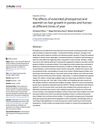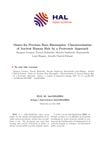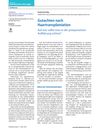 1 citations,
July 2023 in “Cosmetics”
1 citations,
July 2023 in “Cosmetics” The new shampoo effectively delivers caffeine to hair follicles to help keep hair, especially as people age.
 14 citations,
January 2020 in “PloS one”
14 citations,
January 2020 in “PloS one” Timing of light therapy affects horse coat growth, with photoperiod being crucial.
 3 citations,
April 2022 in “Farmacia”
3 citations,
April 2022 in “Farmacia” Certain foods and supplements can help treat skin diseases alongside medication.
 January 2018 in “Clinical dermatology open access journal”
January 2018 in “Clinical dermatology open access journal” The Biofield Energy Treated herbal mixture increased hair growth in mice compared to the untreated mixture.
 7 citations,
June 2017 in “Omics”
7 citations,
June 2017 in “Omics” The study developed a method to analyze ancient hair proteins using very small samples.
 11 citations,
February 2021 in “Trends in Food Science and Technology”
11 citations,
February 2021 in “Trends in Food Science and Technology” Impatiens plants have health-promoting compounds and are used for natural food coloring, but more research is needed to understand their full benefits.
 1 citations,
November 2014
1 citations,
November 2014 The document explains hair and nail biology, common hair loss conditions and treatments, oral and genital skin diseases, and the risks and treatments associated with squamous cell carcinoma.

Human hair keratins can be turned into useful 3D biomedical scaffolds through a freeze-thaw process.
181 citations,
December 2017 in “Trends in immunology” Intestinal intraepithelial lymphocytes are crucial for gut immunity and maintaining the mucosal barrier.
 November 2019 in “Harper's Textbook of Pediatric Dermatology”
November 2019 in “Harper's Textbook of Pediatric Dermatology” The document is a detailed medical reference on skin and genetic disorders.
 7 citations,
January 2017 in “American Journal of Biological Anthropology”
7 citations,
January 2017 in “American Journal of Biological Anthropology” Sardinians were historically short due to a mix of genetics and factors like disease and poor nutrition, but recent height increases suggest better living conditions had a bigger impact.
 1 citations,
May 2023 in “Frontiers in Pharmacology”
1 citations,
May 2023 in “Frontiers in Pharmacology” Millet seed oil may help hair grow by activating certain cell growth signals.
 2 citations,
May 2022 in “Cosmetics”
2 citations,
May 2022 in “Cosmetics” Further research is needed to understand how the microbiome affects hair loss in Alopecia Areata.
 7 citations,
June 2021 in “Trends in Food Science and Technology”
7 citations,
June 2021 in “Trends in Food Science and Technology” Western diet may cause male pattern baldness; low glycemic diet with magnesium could help.
 December 2023 in “Scientific reports”
December 2023 in “Scientific reports” Fermented soy protein may help prevent bone loss by affecting bone cell activity.
 January 2020 in “Asian journal of applied science and technology”
January 2020 in “Asian journal of applied science and technology” Good nutrition is crucial for health and preventing disease, and supplements can help prevent nutrient deficiencies.
 December 2024 in “Journal of Population Therapeutics and Clinical Pharmacology”
December 2024 in “Journal of Population Therapeutics and Clinical Pharmacology” Psoriasis worsens in winter in India due to less sunlight and dry skin, needing personalized treatment.
 January 2022 in “Sustainable development goals series”
January 2022 in “Sustainable development goals series” The document concludes that significant investment in agricultural innovation is necessary to achieve global food security and nutrition.
July 2017 in “Journal of the Dermatology Nurses’ Association” The convention highlighted knowledge sharing, networking, and the importance of active participation in dermatology.
5 citations,
December 2023 in “Materials” Organic and biogenic nanocarriers can improve drug delivery but face challenges like consistency and safety.
 December 2024 in “Quality in Sport”
December 2024 in “Quality in Sport” Diet and lifestyle changes can help manage autoimmune diseases by reducing inflammation and supporting immune health.
 February 2024 in “Medicina-lithuania”
February 2024 in “Medicina-lithuania” Obesity and bariatric surgery can cause hair thinning and temporary hair loss due to nutritional deficiencies and stress.
 June 2008 in “British Journal of Dermatology”
June 2008 in “British Journal of Dermatology” Herpes gestationis is linked to certain antigens, atopic eczema affects T cell populations and may be eased by breastfeeding, higher doses of anti-androgen treatment can improve androgenic alopecia, topical minoxidil increases hair thickness, long-term methotrexate therapy can cause liver fibrosis in psoriasis patients, and Lichen Sclerosus et Atrophicus patients aren't at higher risk for autoimmune disorders.
 June 2021 in “Journal of emerging technologies and innovative research”
June 2021 in “Journal of emerging technologies and innovative research” Onion and Aloe vera can help protect hair from damage caused by hair dyes.
 39 citations,
June 2017 in “Journal of Applied Research on Medicinal and Aromatic Plants”
39 citations,
June 2017 in “Journal of Applied Research on Medicinal and Aromatic Plants” Plant-based ingredients are effective and safe for modern skincare products.
 2 citations,
September 2021 in “JCPSP. Journal of the College of Physicians & Surgeons Pakistan”
2 citations,
September 2021 in “JCPSP. Journal of the College of Physicians & Surgeons Pakistan” Women with PCOS have thicker parafoveal areas in their retinas, but their macular blood vessel density is normal.
 12 citations,
January 2018 in “Journal of Drug Delivery Science and Technology”
12 citations,
January 2018 in “Journal of Drug Delivery Science and Technology” The new particle system could be a promising treatment for diseases related to the 5-α reductase enzyme.
 1 citations,
May 2021 in “Journal Für Ästhetische Chirurgie”
1 citations,
May 2021 in “Journal Für Ästhetische Chirurgie” Doctors should thoroughly inform hair transplant patients about the procedure, risks, and costs to prevent dissatisfaction and legal issues.
 September 2024 in “Journal of the American Academy of Dermatology”
September 2024 in “Journal of the American Academy of Dermatology” The patient responded well to treatment with no disease progression.
Nanoparticles with caffeine can be used for slow, continuous hair growth stimulation.


























